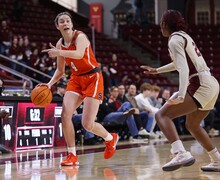Dougherty: Jim Boeheim deserves bulk of blame for NCAA’s findings
Chase Gaewski | Staff Photographer
The NCAA's report on Syracuse University said that head coach Jim Boeheim did not promote an atmosphere of compliance within his program. Now, he's facing the consequences because of it.
It’s been 10 days since the NCAA crammed 11 years of Syracuse’s athletic violations into a 94-page report and threw the future of the basketball program into limbo.
And still, some of the apt questions remain unanswered.
Will SU appeal any of the punishments? Reports say yes, but there’s been nothing concrete from the university’s end. Will any quality high school players still commit to a basketball program that will lose 12 scholarships over a four-year period? Time will tell. Will there be a shake-up in the athletic administration? Tick, tock.
But of all that has left the Syracuse community weighing adoration against accountability, the question of who’s to blame for this mess has a clear-cut answer.
Jim Boeheim.
That’s not to say that Boeheim, the head coach of the SU men’s basketball team, directly participated in the academic violations, forged internships or distribution of impermissible benefits, among all else that Syracuse was found doing. It’s also not to say that he knew about every detail of the NCAA report because that would assume he has 10 extra pairs of eyes and ears.
Yet Boeheim has been the face of Syracuse basketball for 39 years and violations occurred for more than a fourth of his storied career. So if any coach should shoulder the drawn-out, systemic failure of an entire program, it’s him.
He deserves every bit of the nine-game suspension he’s set to serve at the start of conference play next season, and was otherwise unscathed by a situation that will forever stain his career.
“During the 10-year period of violations, the head basketball coach did not promote an atmosphere of compliance within his program,” the NCAA wrote in its press release for the 94-page report, “and did not monitor the activities of those who reported to him as they related to academics and booster involvement.”
Section K of the report’s Analysis section, which details Boeheim’s shortcomings, lists past cases establishing the responsibilities of collegiate head coaches.
University of Michigan (2010) — “monitoring rules compliance in his/her athletics program is first and foremost the responsibility of the program’s head coach.”
University of Connecticut (2011) — “NCAA Bylaw 11.1.2.1 requires coaches to recognize potential problems, address them and report them to athletics administration.”
University of Miami (2013) — “NCAA Bylaw 11.1.2.1 holds head coaches responsible for conduct of staff and requires coaches to seek information related to potential violations.”
No one, most importantly the NCAA, is suggesting that Boeheim committed the violations himself. But he is expected to create a compliant environment and, in that regard, he failed.
Boeheim consciously disregarded the university’s self-written drug policy. He hired a director of basketball operations in Stan Kissel who stripped student-athlete academic services of all its integrity. And he admitted to knowing the program provided Jeff Cornish — who had connections with a local YMCA and AAU team and had a hand in various violations, according to the report — with impermissible benefits.
When the university was hastily — and shadily — trying to restore Fab Melo’s academic eligibility during the 2011–12 season, Boeheim “expressed a desire for the ‘best defensive player in the country to play’ but acknowledged that he hoped it would be done within the rules,” according to the NCAA report.
“… They chose to focus on the rogue and secretive actions of a former employee of the local YMCA and my former Director of Basketball Operations in order to impose an unprecedented series of penalties upon the University and the Men’s Basketball Program,” Boeheim said in a statement released the same day as the NCAA report.
The NCAA “chose to focus” on these facets of Syracuse basketball’s recent past because they’re the ones that broke rules and encouraged a handful of student-athletes to neglect their academics. And still, the reactions from Boeheim and the university have disagreed with the head coach being singled out by the NCAA.
The report cited violations from 2001–12 and Syracuse had two chancellors, two athletic directors and droves of other staffers, administrators and student-athletes cycle in and out of the school and athletic department, in that time.
But it only had one head basketball coach, making Boeheim and the prioritization of victory two clear constants of SU’s wide-ranging infractions.
In college athletics, the successes and legacies of adults are rooted in the play of teenagers and 20-something-year olds — a relationship that the adults have, time and again, turned into a one-way street.
That goes for parents, administrators, AAU coaches, boosters and so on. And the hope is that a head coach — especially one with decades of experience and such strong ties to both the local and basketball communities — would be above that.
For at least 11 years, Jim Boeheim was not.
Jesse Dougherty is a staff writer for The Daily Orange, where his column appears occasionally. He can be reached at jcdoug01@syr.edu or on Twitter at @dougherty_jesse.
Published on March 16, 2015 at 1:00 am





